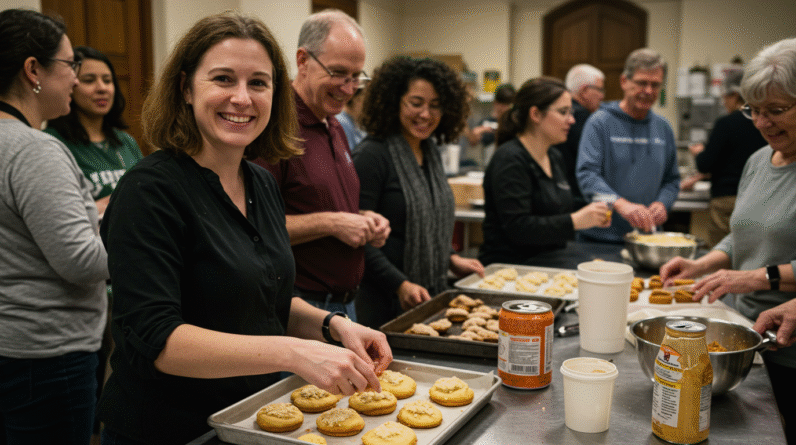How Helping Others Brings True Joy – Inspired By Proverbs 11:25
You were created not to live for yourself alone. When God wired the human heart, He built it to flourish in relationship—with Him and with others. That simple biblical truth shows up again and again in Scripture: when you give your life away, your life is actually renewed. This article unpacks that truth in a way you can take into your everyday life. You’ll see how helping others brings joy not as a vague spiritual slogan but as a practical pattern that refreshes your soul, strengthens your faith, and blesses your community.
This perspective is rooted in a short, powerful proverb: “A generous person will prosper; whoever refreshes others will be refreshed.” Proverbs 11:25. We’ll look at what that means for you, explore biblical examples, consider practical steps, and offer encouragement for when it feels risky or costly to serve. Along the way, you’ll find that helping others brings joy in ways you might not expect.
Reading the Proverb: What Proverbs 11:25 Really Says
The proverb is concise yet rich in meaning. Proverbs 11:25 pairs two ideas: generosity and refreshing. “Prosper” in the proverb isn’t simply about accumulating wealth; it’s about thriving—emotionally, spiritually, and relationally. “Refreshing others” points to acts that restore someone’s strength, dignity, hope, or joy.
When you read the verse in its biblical context, you begin to sense a spiritual law: generosity creates renewal. The person who gives—time, resources, attention, or encouragement—often returns home spiritually renewed. That renewal is more than a warm feeling; it’s a deep, God-produced joy that bears fruit in your life and the lives of others.
Why Generosity Refreshes the Soul
You might ask, “Why does generosity have this effect? Isn’t it better to secure my own future?” The Bible answers that question by pointing to two realities: human dependence and God’s economy. God designed people for interdependence and to reflect His character. When you imitate God in giving, you participate in His work, and that participation brings joy.
Beyond theology, there’s a practical psychology at work. When you focus outward—on meeting a need, carrying a burden, or speaking life into someone—you break the cycle of self-centered fear and rumination—serving shifts your focus from your limitations to God’s power working through you. When that happens, the heavy load of anxiety and isolation lifts, and joy begins to flow. That’s why helping others brings joy: your heart is aligned with God’s heart, and your life becomes an instrument of blessing.
Biblical Examples That Show Helping Others Brings Joy
Scripture is full of examples that show how giving creates blessing. Think about Jesus’ teaching about giving and receiving: “Give, and it will be given to you.” Luke 6:38. Jesus wasn’t promoting a transactional system where you manipulate outcomes; He was pointing to a kingdom principle: the overflow of God’s grace meets generosity. When you help others, your life becomes part of God’s generous economy—and God’s abundance returns to you in different forms: spiritual strength, peace, relationships, and yes, often material provision.
The early church practiced radical generosity. Paul reminds the believers of a truth he learned working with churches: “It is more blessed to give than to receive.” Acts 20:35. That wasn’t a slogan; it was a pattern. When the church gave to meet needs, people were drawn together, faith grew, and joy spread.
Another clear example comes from the story Jesus told about the sheep and the goats, where caring for “the least of these” is equated with serving Christ himself. Your small acts of service have spiritual significance far beyond what you can see. Matthew 25:35-40.
The Spiritual Mechanics: How the Holy Spirit Uses Your Generosity
You serve, and the Holy Spirit uses that act to change you. Generosity often softens your heart, humbles you, and opens you to dependence on God. Paul describes a principle that captures this dynamic: “Whoever sows sparingly will also reap sparingly, and whoever sows generously will also reap generously.” 2 Corinthians 9:6. The cultivation of generosity shapes character. The act of giving trains your soul to trust God more than possessions, and trust is the soil in which joy grows.
The Spirit also uses generosity to reveal God’s provision. When you step out to meet a need, you often experience small, unexpected answers—an encouraging word, an unexpected resource, a strengthened relationship. Those become evidence of God’s faithfulness in your life, and that evidence produces joy.
The Social and Emotional Benefits of Serving Others
You’ll find joy in serving not only because it’s spiritual, but because it’s social. Helping releases oxytocin and dopamine—chemicals that make you feel connected and rewarded. When you encourage, mentor, or simply listen to someone in pain, you build trust and deepen relationships. Those relationships become sources of belonging and meaning.
Generosity also breaks down isolation. In a culture that prizes independence, you may be tempted to solve everything on your own. But when you help someone or allow someone to help you, a relational bond forms. That bond brings mutual support and long-term joy. The apostle Paul frames Christian community as carrying each other’s burdens: “Carry each other’s burdens, and in this way you will fulfill the law of Christ.” Galatians 6:2. You’re not meant to go it alone, and serving creates the environment where communal joy can grow.

Practical Ways You Can Start Today
You don’t have to wait for a big moment to begin practicing generosity. God honors ordinary faithfulness. Here are practical, immediate ways to put generosity into practice so you can experience how helping others brings joy:
- Look for small daily opportunities to encourage someone—send a text, make a call, bring a coffee.
- Volunteer consistently rather than sporadically; faithfulness builds depth.
- Give financially with generosity and prayer; be joyful and intentional about your giving.
- Offer your skills—tutoring, yard work, professional help—to someone who can’t easily afford them.
- Listen actively and be present; sometimes your time is the most valuable gift.
Each of these steps trains your heart to notice need and respond. As you practice them, you’ll begin to sense that helping others brings joy not only to those you serve but to you as well.
Overcoming Common Barriers to Generosity
Maybe your instinct is to hold back. You’re not alone. Fear, scarcity thinking, pride, and busyness are real barriers. Let’s tackle them together in a pastoral, practical way.
- Fear: You might worry about not having enough. Remember generosity is an act of trust. Start small, be consistent, and watch how God provides.
- Scarcity thinking: It’s easy to believe that resources are fixed. Scripture invites you to a different reality—God is not limited by your budget. He multiplies what you offer when He’s in control.
- Pride: Sometimes pride hinders giving because it feels risky to be vulnerable. Recognize that humility opens you to God’s work in and through you.
- Busyness: If your schedule is full, you can still be generous with attention, prayer, and consistent small sacrifices. Rhythm matters more than size.
These aren’t quick fixes, but practical wisdom: begin where you are, be faithful, and let God do the rest. The habit of generosity retrains your thinking. Over time, you’ll find that helping others brings joy more naturally than you expected.
When Helping Others Costs You: Finding Joy in Sacrifice
There will be times when serving costs you—time, money, reputation, or emotional energy. That’s part of the gospel. Jesus didn’t promise comfort; He promised life—life poured out. The paradox is that when you lay down something for the sake of Christ and others, you often discover a greater, longer-lasting joy.
Paul described a congregation who, despite their own poverty, gave generously and found joy in sharing. Generosity is not about measuring return on investment in worldly terms; it’s about aligning with God’s purposes. Even when the cost is high, you can trust that God sees, remembers, and multiplies what you’ve given in ways you can’t predict. The Christian life is a story of sacrificial love that creates meaning and joy, even in hardship.
Stories of Refreshment: Real-Life Examples
You need stories—real, ordinary-life illustrations that show this truth. Consider the single parent who volunteered at a shelter and, through serving, found a community that supported her through a health crisis. Or the retiree who taught reading at the local library and experienced a renewed sense of purpose and connection. Or a teenager who started a small fundraiser for classmates in need and discovered a deep, abiding satisfaction that no social media “like” could match.
These aren’t miracles in the flashy sense; they’re the steady work of God in human lives. As you lean into the rhythm of giving, you’ll likely collect your own stories—moments when your heart was unexpectedly lifted, when prayer was answered, or when a relationship deepened. Those stories become the evidence that helping others brings joy.
Growing a Lifestyle of Generosity in Your Family and Church
Your generosity influences others. If you want your children, family, or church to be generous, model it openly. Talk about why you give, let them see you serving, and give small responsibilities to younger members so generosity becomes a family habit. When a church emphasizes generosity as spiritual formation rather than fund-raising, you build a culture where people give sacrificially out of joy.
Create practices: a monthly service day, a budget category for giving, a testimony time where people share how serving changed them. When generosity is framed as spiritual formation, you help people move from guilt-driven giving to joy-driven generosity. Over time, you’ll see how helping others brings joy across generations and communities.
The Role of Prayer and Dependence
You can’t cultivate generous living in your own strength. Prayer puts you in God’s perspective. Ask God to show you where to give, who to serve, and how much to risk. Pray for the people you serve; praying binds your heart to theirs and invites God to work. Jesus modeled prayerful, dependent service, and He invites you into the same posture.
When you pray, ask for two things: discernment to see real needs and courage to respond. Then, expect small steps of faith. God honors those steps. As you practice this, you’ll find that helping others brings joy because your life becomes a partnership with God, not just a series of isolated actions.
Long-Term Joy Versus Fleeting Pleasure
You may experience two different kinds of positive feelings—fleeting pleasure and deep joy. Fleeting pleasures are temporary: a compliment, a purchase, a moment of recognition. Deep joy is more durable; it persists through seasons of difficulty because it’s rooted in purpose and relationship. When you regularly help others, you feed the deep joy that lasts.
The New Testament frames this in terms of bearing fruit. When you love and serve, you’re producing spiritual fruit that outlasts momentary happiness: character, hope, community, and maturity. Jesus says that love for one another is the proof that you belong to Him. “A new command I give you: Love one another. As I have loved you, so you must love one another.” John 13:34-35. That love bears fruit—joy that becomes a testimony to others.

Practical Steps to Keep Moving Forward
You want to make generosity a habit, not a one-off burst of emotion. Here are practical steps that will help you keep moving forward in generosity so you can grow in the experience that helping others brings joy:
- Start a small, consistent habit—five minutes of intentional service each day or a monthly giving target. Consistency beats intensity.
- Journal your experiences—note times when serving felt meaningful or when God provided unexpectedly. Over time, your journal will become a powerful reminder.
- Join a small group that serves together. Shared service builds accountability and multiplies joy.
- Set boundaries so you don’t burn out. Generosity without rest becomes resentment. Sabbath and rhythm matter.
- Celebrate stories. Share testimonies at home or church to keep the community inspired.
These steps keep you from being reactive and help you move toward a life where generosity is a defining trait. As you practice them, you’ll find that helping others brings joy more reliably and more deeply.
A Simple Prayer to Begin
Would you pray slowly with me? Use your own words if you prefer.
“Lord, open my eyes to the people around me. Give me the courage to step into their need and the wisdom to respond in love. Teach me to trust You as I give of my time, resources, and attention. Refresh my heart so I can refresh others. Amen.”
Prayer reorients your heart and invites the Holy Spirit to lead your generosity. Don’t rush it—let prayer shape how you act.
Final Encouragement: You’ve Been Created to Give
Never forget this basic truth: God made you to be a blessing. When you obey that design—when you look outward, notice needs, step in to help—you align with the Creator’s purpose. That alignment births a joy that is deep and resilient. As Proverbs reminds you, when you refresh others, you yourself will be refreshed. Proverbs 11:25.
Practice shows over and over that helping others brings joy. It might not always look dramatic. Often it looks like consistent small acts: a meal for a grieving neighbor, a listening ear for someone lonely, a donation that helps a family breathe easier. But those small acts add up to a life that pulses with meaning and reflects God’s generous heart.
If you’ll take one step today, make it small and tangible. Choose one person to bless this week, and do it with prayerful expectation. Watch how your heart responds. You’ll likely discover what countless believers have learned: the way to be truly satisfied is to give yourself away.
Explore More
For further reading and encouragement, check out these posts:
👉 7 Bible Verses About Faith in Hard Times
👉 Job’s Faith: What We Can Learn From His Trials
👉 How To Trust God When Everything Falls Apart
👉 Why God Allows Suffering – A Biblical Perspective
👉 Faith Over Fear: How To Stand Strong In Uncertain Seasons
👉 How To Encourage Someone Struggling With Their Faith
👉 5 Prayers for Strength When You’re Feeling Weak

📘 Jesus and the Woman Caught in Adultery – Grace and Mercy Over Judgement
A powerful retelling of John 8:1-11. This book brings to life the depth of forgiveness, mercy, and God’s unwavering love.
👉 Check it now on Amazon
As a ClickBank Affiliate, I earn from qualifying purchases.
Acknowledgment: All Bible verses referenced in this article were accessed via Bible Gateway (or Bible Hub).
“Want to explore more? Check out our latest post on Why Jesus? and discover the life-changing truth of the Gospel!”








